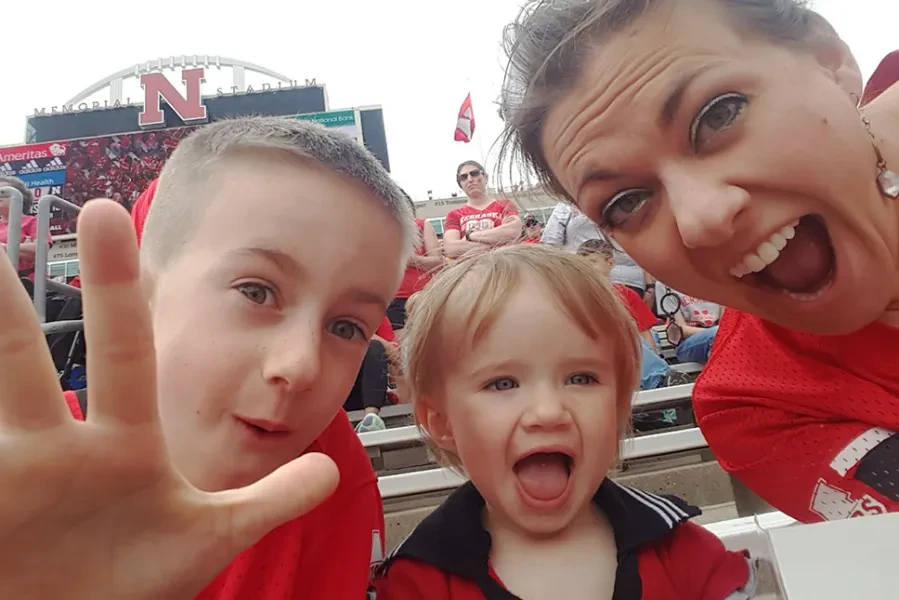Editor’s Note: This month we continue our series highlighting faculty favorites based on feedback from students and alumni.
Growing up in a rural farming community, the only adults Dr. Stephanie Anderson knew with a college degree were her teachers and her doctor. An education beyond high school, she observed, was mostly earned in technical and trade schools.
“I knew I wanted to go to college after high school, but nobody in my family had attended a university before me and so just earning a bachelor’s degree was a pretty lofty goal at the time,” says Dr. Anderson, who is an associate professor in the College of Health, Human Services, and Science at the University of Arizona Global Campus. “I had no intentions of anything more because, quite honestly, I didn’t even know that was how higher education worked.”
She quickly caught on, however, earning a 4.0 GPA at the undergraduate level. After receiving her Bachelor of Arts in Psychology and Sociology at the University of Nebraska at Kearney, she went on to earn a Master of Arts in Social Psychology and eventually reached the pinnacle of her education when she received a Doctor of Philosophy in Social Psychology – both at the University of Kansas.
Dr. Anderson had originally planned to become an English teacher but found even greater inspiration in her college instructors.
“I envied how they spent their days learning,” she says. Her own lifelong love of learning led her to Central Community College in Hastings, Nebraska, where she began teaching in 2007. She taught at CCC for six years before returning to the University of Nebraska at Kearney to teach for another year. In 2014, she joined the University of Arizona Global Campus.
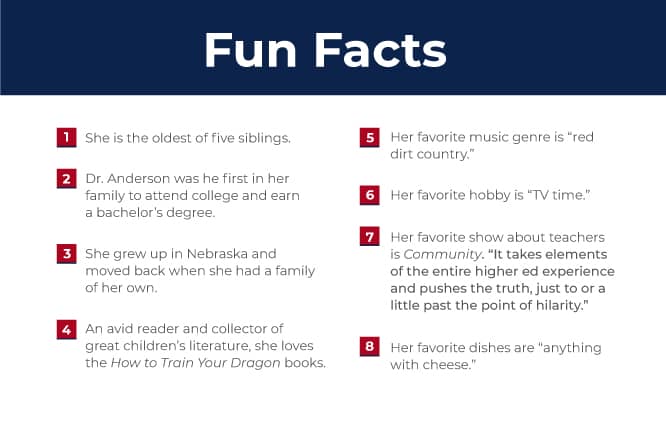
The Evolution of Education
By the time Dr. Anderson arrived at the university, the traditional brick-and-mortar model of education was no longer the only option for students. The shift to online learning has been the most noticeable change she’s seen in education since beginning her teaching career.
“A student today could literally earn a degree without ever stepping foot in a physical library, or even on a campus,” she says. “This is an enormous advantage, providing opportunities to those who wouldn’t otherwise have them and simplifying the lives of those who are attending school.”
Still, Dr. Anderson acknowledges, online learning is not without its challenges, and she identifies with students who are juggling careers, family, and school. The best strategy for achieving success, she explains, is to make efficient use of what time is available.
“Figure out exactly what the goal is, and work to that,” she says. “This will be constantly in flux and should be reevaluated every day. It’s all about balance.”
Thinking Like a Teacher
Growing up in a large family with four younger siblings, Dr. Anderson found herself “teaching” at an early age and realized that she could serve a purpose as a role model. In her career, she stresses honesty and openness between herself and her students, and she wants them to understand that not every path to success is a straight and narrow road.”
The key to staying on track, Dr. Anderson explains, is to think like a teacher.
“When completing homework, imagine being the instructor,” she says. “Try to think about the point of assigning [the work] and what it will take to demonstrate knowledge of the objective.”
College is a learning experience, no matter what age you are, and Dr. Anderson encourages students to reach out when in doubt. After all, you cannot know the answer if you never ask the question.
“Sometimes students apologize for asking questions, which always makes me feel as though we’ve failed them by not being engaging or approachable,” she says. “Answering questions is basically our job.”
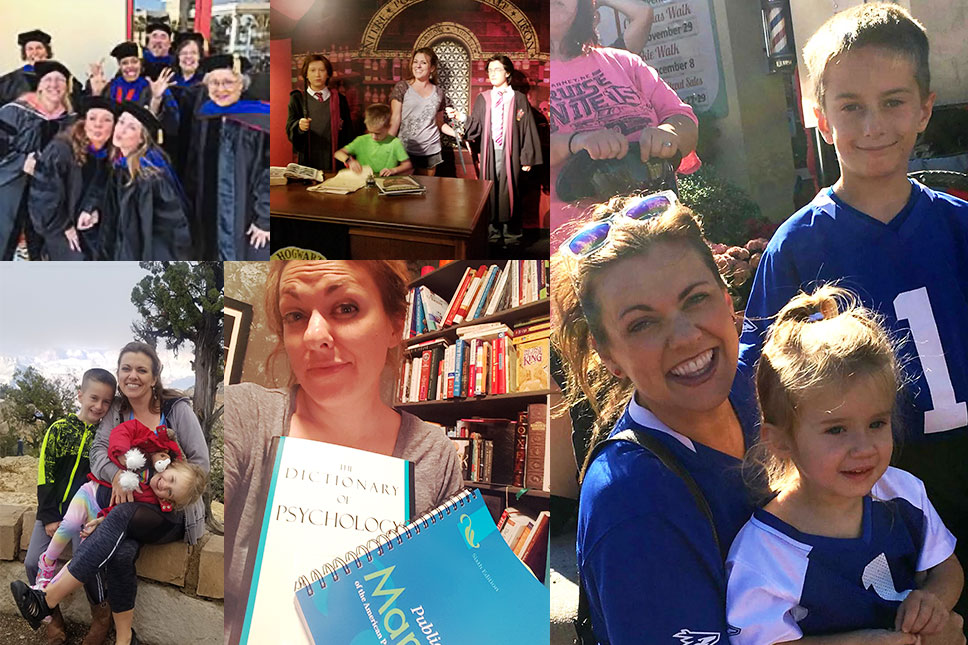
Getting to Know Dr. Stephanie Anderson
Dr. Anderson is a product of her environment and the people who have been closest to her throughout her life. From her immediate family to her college advisors, she has spent her life learning and observing those with the power to connect and teach others. Having so many positive influences has helped her maintain focus and inspired her to become an educator who never stops learning. Here, we learn a little more about what motivates Dr. Anderson.
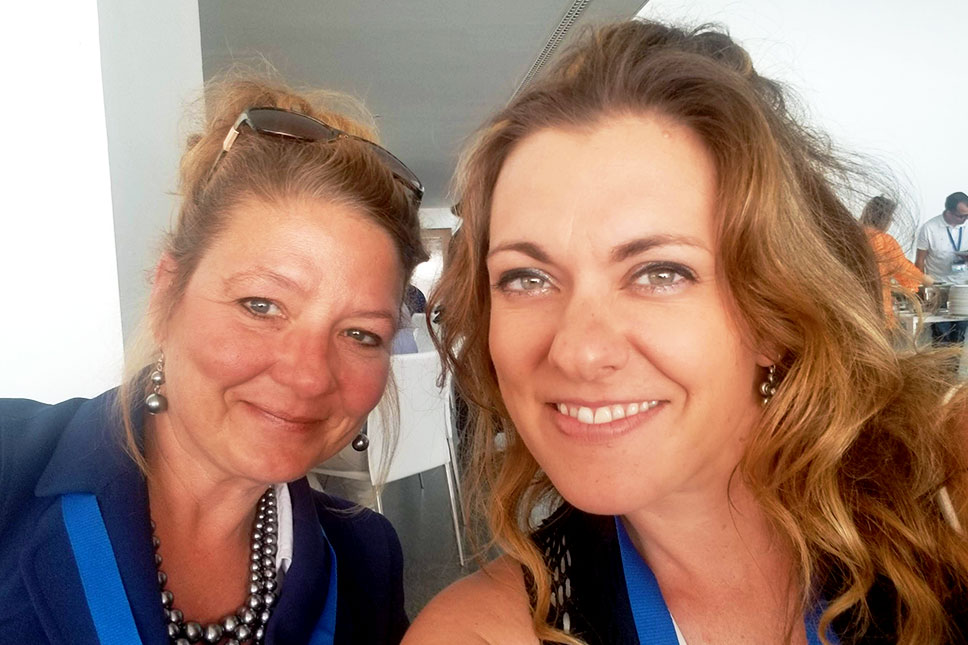
Dr. Stephanie Anderson, (right) with Dr. Michelle Rosser-Majors, associate professor and chair of the Bachelor of Arts in Psychology program in the College of Health, Human Services, and Science.
Global Campus: Who has been a mentor to you?
Dr. Anderson: I would characterize both my undergraduate and graduate advisors as mentors. Dr. Richard Miller (University of Nebraska at Kearney), my undergraduate advisor, was absolutely without a doubt instrumental in my education, leading to my career. The most important thing he did for me was to believe in me.
His confidence in my ability—to do scholarly research, to present at academic conferences, to publish my work, and ultimately to attend graduate school, none of which I had ever imagined doing but all of which I accomplished with his assistance—sparked just enough confidence in myself to try new things, take the next step, and little by little, those successes added up until I realized I was capable of more than I knew. He graciously invited me to spend two weeks with him and his wife Jeanne in Mallorca, Spain, during my senior year of college, to conduct a research project.
This experience prompted a realization that cultural psychology was my passion. So, I chose Dr. Glenn Adams (University of Kansas) as my graduate advisor. He really challenged me to become a more critical thinker, exposing me to new perspectives and really helping me develop the skills necessary to be an academic. Both of these individuals introduced opportunities I would not have otherwise discovered or attempted.

Dr. Stephanie Anderson counts two cats as part of her family.
Global Campus: In what ways does your family inspire you?
Dr. Anderson: Ah, my family! Love, love, love. My parents are the most hard-working people I know. They instilled this work ethic in me, which has served me quite well. They’ve inspired me in many ways. I actually remember the precise moment when I decided I would be ‘smart.’ I got a ribbon for a spelling contest, and when I presented it to my dad, he took a thumbtack and pressed it into the wall right where we were standing. I couldn’t believe he would ruin the wall just to display this, so I knew he was proud. This drove me to continually pursue excellence.
Although they encouraged me to become well rounded (and, in fact, I participated in virtually everything in high school—sports, drama, speech, quiz bowl, cheerleading, etc.), I was mostly competitive with myself.
My mom inspired me differently. She knew everything. She still does, really. She can turn anything into a teachable moment. She would engage us kids during all sorts of daily activities, cooking, cleaning, and playing. My parents knew they wanted all of us to go to college to have opportunities they didn’t have, and all five of us ultimately graduated from the same school, UNK! To them, college wasn’t an option. It was expected. They never said ‘if,’ it was always ‘when’ you go to college. Looking back, I’m sure they were bluffing, because they had no idea how the process worked and they were unable to pay for it, but they made sure we did well enough in school to earn scholarships and sought information necessary to apply for loans and grants, so we just did it!

Dr. Stephanie Anderson explores a museum with her children.
Global Campus: How do you serve as a role model for your kids?
Dr. Anderson: I try to serve as a role model by supporting their education. For instance, the last several years I’ve taken my kids out of school to accompany me on various work trips (when I have to travel to attend professional conferences). There are things to do and see along the way that I feel are just as valuable as what they’re learning in the classroom. I want them to realize there are opportunities to learn every day, everywhere. Culture, art, history, unique experiences. Even their activities (sports, music, etc.) are important for their development, not just physical but also social, emotional, and cognitive.
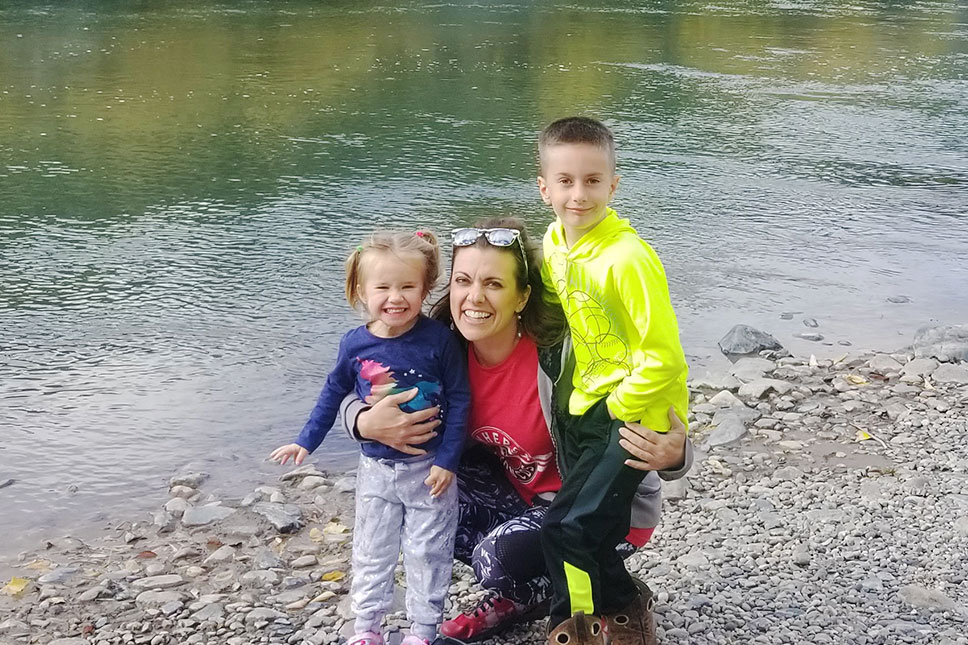
Dr. Stephanie Anderson enjoys taking the education adventure outdoors.
Global Campus: What do you love about living in Nebraska?
Dr. Anderson: I love, love Nebraska. It’s the good life. Honestly, it’s not for everyone. But it truly is the good life, with great people. I think the greatness of our people can be seen on football Saturdays in the fall and during tragedies, like the recent natural disasters caused by winter weather and flooding. People just come together and really treat each other like neighbors, whether or not they actually are. It is truly the best place to raise kids, too.
--
By University Staff
